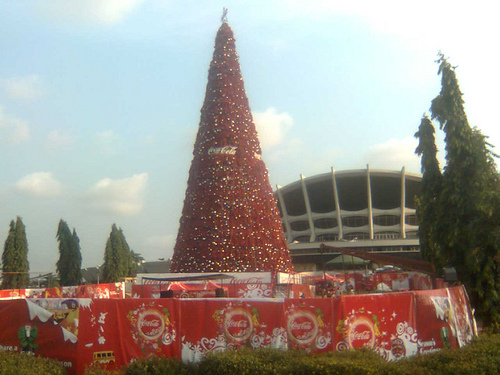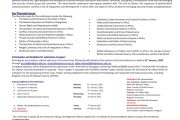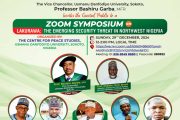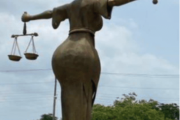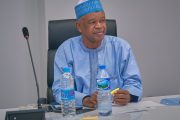It is Xmas again and messages from leaders is a major part of it. So, what are the leaders in Nigeria saying and by how do we know what they actually mean? Of course, this has to start from President Muhammadu Buhari, being the one at the top of the hierarchy. The crux of the president’s message might be his expressed deep conviction that better days lie ahead for Nigeria based on progress “on all the major fronts where we have set our energies to surmount the challenges”. What might this mean? It would seem to be an honest admission that his eyes are set on colonizing the future, another way of saying the recent past has not been too good. He is, therefore, asking his national audience to choose between sacrificing for a better future and having a better Now. This is the sort of poser his critics would respond to by saying, “but, on the long run, we would all be dead”.

President Muhammadu Buhari in a February 2015 pix
This is exactly what the opposition People’s Democratic Party, (PDP) didn’t miss in saying. Diran Odeyemi who spoke for the party this time said “In a civilised environment, a score card of failure and evidences of failed promises after three years of governance are enough indices to tender a letter of resignation and not words of assurances of a better tomorrow”. Atiku Abubakar had fired the first shot a day earlier when he implored Nigerians to accept the responsibility to make Nigeria work, meaning that, as far as he is concerned, Nigeria is not working at the moment.
By a curious coincidence, the president also took on the issue of those suffering various manifestations of insecurity such as in the Mediterranean and Libya, a theme his leading contender so far, Atiku Abubakar had taken up in his own message which came earlier. And both found themselves saying virtually the same thing, with the president isolating transborder syndicates as the culprit and condemning their wickedness.
In taking this position, we see the president pitching his moral self against the undeclared message of transborder traffickers which is that, under capitalism, profit is the essence and, in this, any distinction between one commodity such as human beings and any other set of commodities is a superficial distinction. So, they go ahead with it, daring the world to stop them if they can. But since the human trafficking is worse for the Africans, it behoves a Nigerian leader to take a position informed by a more critical analysis of the challenge. Of course, human trafficking is cruel and wicked but so also was slave traders.
Perhaps, we cannot stop an elected president from the moral reflex but we should also see the analytical reflex alongside the dour moralisation of the most pernicious manifestation of a terrible global system. If the president is fearful of the transborder syndicates and nobody will blame him for that, he has the option of remaining silent.
Professor Yemi Osinbajo’s own Christmas message came through a symbolic action of taking over as a petrol attendant at a fuel station. Smart guy! Populism is under fire but populism sells. So, no one might blame him, partly because he was responding in his own way to a situation that has challenged state power.
Governance is all about anticipation, surveillance, control and circulation. The chaos observable in Abuja on Sunday, (yesterday) is the very anti-thesis of governance. Unfortunately, the president admitted to all these, inadvertently perhaps, when he issued a statement he is said to have personally signed, another strategic error, stating how regrettable the nationwide fuel scarcity is and how he sympathized with all Nigerians for having to endure what he called “needless fuel queues”.
In thus relapsing to the need to be seen to be engaging the situation personally, the president was confirming what his former deputy, the late Chuba Okadigbo, would have called dynamic inactivity. Otherwise, what is the message in saying that he is being regularly briefed when he is the chief briefing officer of the federation? Is there any student of governmentality in this government?
All judgments must stand in comparison. A writer calculated the number of times former president, Goodluck Jonathan, used the word ‘vow’ in his linguistics of power. He concluded that when a sitting president is still vowing to make a move, then he has run out of gas. President Buhari might have to watch it. He is already in power, no longer a presidential aspirant.

So, who is the regime expert on Governmentality here?
That is to say that it is proper and fitting for the Boss Mustaphas, Maikanti Barus and ministers to be explaining and threatening whoever deserves to be explained to or threatened but when the president comes in, it must be with some actions or pronouncements that amount to actions. Both Boss Mustapha, the Secretary to the Government of the Federation and Maikanti Baru, the GMD of NNPC, have said there is no plan to increase pump price of fuel, with one of them saying it is the greed of marketers that is at work. Admitting that the greed of any group in the society caused the sort of paralysis across the country in the past few days is bad management of power but it is permissible for officials at their level. Baru in fact, showed the way somehow with his idea of a ‘Fuel War Room comprising team members from the NNPC, DPR, PPRA and PEF, with support from security agencies’. While some people would find it interesting to ask the GMD of the NNPC what these same agencies were doing that they did not anticipate this, no one would carpet him for fulfilling the requirement of truth unique to governance, especially when seen from the point of view that speaking is doing. So, when the president enters the arena saying the same things they have said, then there appears to be a problem.
This reviewer found two governors who strutted into the Christmas message hall inviting. Governors Aminu Tambuwal of Sokoto State and his Bayelsa counterpart, Seriake Dickson, were saying very interesting things. Although the Bayelsa governor demanded of fellow citizens to live a Christ-like life, he targeted his message more at political leaders whom he asked to deploy their offices to advance the cause of the ordinary people. “Jesus Christ used his earthly ministry for the common good of humanity and above all, died for our sins. Our faith would have been in vain if Jesus had not sacrificed himself for us all. I therefore call on political actors and privileged Nigerians to always work for the good of the people and do things that would foster unity in the country”. Uhm! What the harsh scoring of his fellow leaders suggest is that the governor must be very powerful to play the role of an internal critic. Only powerful players or extraordinarily resilient actors can harass the system of which they are part and survive it.
Tambuwal, on his part, approaches the situation differently. While admitting the “fact that the last few days have been tough for our nation especially because of glitches in the supply of fuel”, he nevertheless urges Nigerians to “trust those in charge to overcome the challenges in the shortest possible time”. That is, by the wisdom of our brother at the Government House in Sokoto, we, the people, should trust the same people who met or created problems they have not been able to resolve them. Okay oh!

APC power broker, Bola Ahmed Tinubu
In all these and in the absence of Christmas messages yet from the likes of Bukola Saraki, Yakubu Dogara, the Sultan of Sokoto and many more, who gets the award for the more elevated or more imaginative Christmas message in Nigeria as far as 2017 is concerned? Without hesitation, that goes to Ahmed Bola Tinubu, the APC chieftain.
It is not clear why most media houses framed APC leader, Bola Tinubu’s statement in terms of calling for support for President Buhari government. He did so but it came in as a logical follow-up to a well organised analogy. Intervention might not be free of abstraction but less guilty than others in the following interpretation of Tinubu.
First of all, Tinubu framed Jesus Christ out of Christian particularism. He says: “Be you Christian, Muslim or just a human being with a soul that yearns for peace, compassion and hope, Jesus Christ belongs to all of us. His teachings are universal in application and speak of truths eternal”. The universalism the politician is referencing is in trouble as a concept in the world today but a Muslim who could do that in a deeply divided Nigeria is saying something worth reflecting upon. It is beyond the bland things being communicated in the messages leaders are sending.
“This Christmas, let us acknowledge his birth but let us also give that acknowledgement its fullest meaning by recognising how Jesus lived and what he lived for. He reached out to all. Jesus fed the poor and healed the sick. He spread compassion and charity and preached love and justice. There are no finer aims than these and we can do no better than to do all we can to follow his example.
Very significant in this paragraph are two qualifiers employed: the notion of ‘fullest meaning’ and ‘finer aims’. Someone might see politics in that but that doesn’t destroy the beauty they embody. That beauty has conceptual and practical implications because there is no China Wall between the conceptual and the practical. Again, Tinubu offers something interesting here. He doesn’t make anyone the target of his analysis even as that is implied. By so doing, he is also telling us indirectly that even his own party, the APC could benefit from the beauty of reaching out to all and broadening the finer aims at stake in his discourse.
It is in relating this outline to what is on the ground that his message has any connection with the government of the day rather than in the direct sense in which media headlines represented it. He said: “The challenges that face the country are difficult ones. But we keep the hope. We must learn from the example of Jesus who faced and overcame the greatest evil. So let us unite to overcome our challenges”. He then went on to argue that: “We must support President Buhari and complement his efforts in his resolve to stimulate the economy and reposition the country. The President needs our support, understanding and prayers. We must fully break the terrorism of Boko Haram and completely put down the last vestiges of the terrorists”.
Then he brought in the question of prayerful solidarity with “the men in uniform who risk their lives to keep us safe and to end this scourge on the nation”, a reference to the troops in the war front the same way that the president and, before him, Atiku Abubakar, had said. It suggests that even as they prepare to slug it out in 2018/19, they still have a consensus on boosting the morale of troops. But, again, Tinubu went further by insisting that “we must do more than pray” and play the role Jesus played by giving himself for others.
Every discourse seeks power in the sense that it is either a defence of the status quo or an attack on it. Tinubu’s is no exception but he has conveyed his discourse in a more reflexive sense that it is neither an attack on the status quo nor a bullish defence of the indefensible. For a medium such as Intervention which does not operate by the binary logic of right or wrong but takes a case by case approach, it is an editorial imperative to recognise Bola Ahmed Tinubu’s discursive dexterity in this Christmas message. His 2016 or 2018 Christmas message might not have been anything to celebrate. This is one is.

